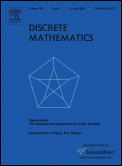Discrete Mathematics (journal)
 | |
| Discipline | Mathematics |
|---|---|
| Language | English |
| Edited by | Douglas B. West |
| Publication details | |
| History | 1971–present |
| Publisher | |
| Frequency | 24/year |
| 0.87 (2020) | |
| Standard abbreviations | |
| ISO 4 | Discrete Math. |
| Indexing | |
| CODEN | DSMHA4 |
| ISSN | 0012-365X |
| LCCN | 72621801 |
| OCLC no. | 471516939 |
| Links | |
Discrete Mathematics is a biweekly peer-reviewed scientific journal in the broad area of discrete mathematics, combinatorics, graph theory, and their applications. It was established in 1971 and is published by North-Holland Publishing Company. It publishes both short notes, full length contributions, as well as survey articles. In addition, the journal publishes a number of special issues each year dedicated to a particular topic. Although originally it published articles in French and German, it now allows only English language articles. The editor-in-chief is Douglas West (University of Illinois, Urbana).
History
The journal was established in 1971. The very first article it published was written by Paul Erdős, who went on to publish a total of 84 papers in the journal.
Abstracting and indexing
The journal is abstracted and indexed in:
According to the Journal Citation Reports, the journal has a 2020 impact factor of 0.87.[1]
Notable publications
- The 1972 paper by László Lovász on the study of perfect graphs (Lovász, László (1972). "Normal hypergraphs and the perfect graph conjecture". Discrete Mathematics. 2 (3): 253–267. doi:10.1016/0012-365X(72)90006-4.)
- The 1973 short note "Acyclic orientations of graphs" by Richard Stanley on the study of the chromatic polynomial and its generalizations (Stanley, R. P. (1973). "Acyclic orientations of graphs". Discrete Mathematics. 5 (2): 171–178. doi:10.1016/0012-365X(73)90108-8.)
- Václav Chvátal introduced graph toughness in 1973 (Chvátal, Václav (1973). "Tough graphs and Hamiltonian circuits". Discrete Mathematics. 5 (3): 215–228. doi:10.1016/0012-365X(73)90138-6. MR 0316301.)
- The 1975 paper by László Lovász on the linear programming relaxation for the set cover problem.
- The 1980 paper by Philippe Flajolet on the combinatorics of continued fractions. (Flajolet, P. (1980). "Combinatorial aspects of continued fractions" (PDF). Discrete Mathematics. 32 (2): 125–161. doi:10.1016/0012-365x(80)90050-3.)
- The 1985 paper by Bressoud and Zeilberger proved Andrews's q-Dyson conjecture (Zeilberger, Doron; Bressoud, David M. (1985). "A proof of Andrews' q-Dyson conjecture". Discrete Mathematics. 54 (2): 201–224. doi:10.1016/0012-365X(85)90081-0. MR 0791661.)
References
- ^ "Discrete Mathematics". 2020 Journal Citation Reports. Web of Science (Science ed.). Thomson Reuters. 2021.
